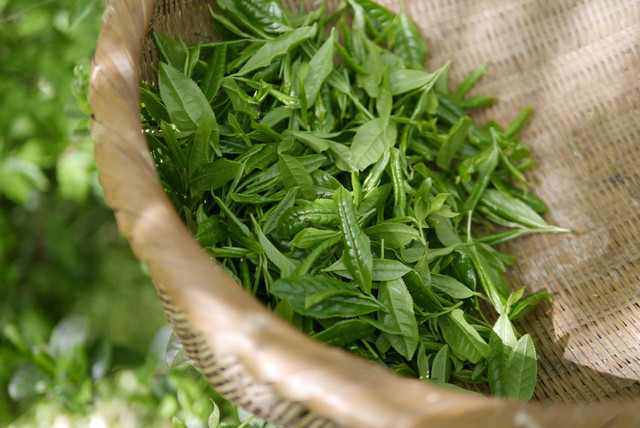Green tea side effects can be both positive and negative — for you and the environment. Read on for more info on this popular caffeinated beverage.
Green tea side effects can range from positive health benefits to environmental damage, so understanding a little more about this popular brew will help you decide if it is right for you. Around 15% of all tea consumed in the US is green tea, and it has been used as a medicinal drink in China, Japan and India for centuries. It initially gained popularity worldwide due to its reported health benefits but has also received bad press because of the potential adverse side effects.
What Is Green Tea?

(Foto: CC0 / Pixabay / hana_chado)
Many types of tea — including black, green and oolong — come from the plant Camellia sinensis. How the plants are processed determines the strain of tea produced. To make green tea, leaves from the Camellia sinensis plant are steamed, pan-fried and dried.
Green teas retain many antioxidants and other compounds that would otherwise disappear if they were fermented. Green tea gets its name from the emerald green color created when brewing these unfermented leaves. The FDA approves the use of oil-soluble green tea extract as an antioxidant in food.
Green Tea Side Effects: The Environment



(Foto: CC0 / Pixabay / 12019)
There are only about 30 established farms in the US growing Camellia sinensis. Most green tea is imported, with China being the major producer globally. The most catastrophic environmental impacts of green tea production include:
- Habitat conversion
- Deforestation of the land
- Soil erosion
- Pesticide and fertilizer use
- Destruction of biodiversity
Better practices can significantly reduce these environmental impacts of tea production and are being implemented in many countries. From 2014 to 2018, the Rainforest Alliance worked with the United Nations Environment Program (UNEP) and other partners on a four-year sustainable tea program in several Asian countries. According to UNEP, sustainable tea production can play a significant role in rural development, poverty reduction and food security for developing nations — providing green jobs and income for disadvantaged areas.
Some manufacturers use chemicals like chlorine bleach and plastics in manufacturing their tea bags and continue to package their products in single-use plastic. Tea bags have been shown to release billions of microplastics, both into the tea itself and the environment — adding to the current environmental catastrophe. You can check your supplier or avoid this dilemma entirely by making DIY teabags at home.
In a recent survey, 65% of consumers said they want to buy brands that advocate sustainability, yet only about 26% do so. It is theorized that consumers often have negative associations with sustainable product options, viewing them as being of lower quality, less aesthetically pleasing and more expensive. Choosing sustainable and less attractively packaged green tea from local sources does not affect the quality and just might help you avoid a mug of microplastics for breakfast.
Green Tea Side Effects: The Positives



(Foto: CC0 / Pixabay / klagergren)
There is little nutritional value in green tea, and it contains a relatively small amount of caffeine. The caffeine concentration in a cup of green tea varies according to the duration of steeping time and the amount of tea you use. The drink’s primary benefits lie in the other bioactive molecules it contains. Although many studies cover green tea and its extracts, few firm conclusions have been made. Regardless, green tea continues to be associated with a range of health benefits.
Tea polyphenols — the main group being flavonoids called catechins — have many biological functions. The tea you use, water temperature and steeping time will all impact the levels of these compounds you consume. Warm, not boiling, temperatures are best to retain antioxidant compounds, so allow boiled water to cool slightly before pouring it over your tea leaves for optimal benefits from green tea.
Some studies suggest that green tea may have neuroprotective and stress-reducing properties. The current evidence also suggests that green tea may have positive side effects, including:
- Anti-inflammatory effects
- Antioxidant properties
- Anticarcinogenic effects
- Cardiovascular and metabolic health
- Weight loss
Green Tea Side Effects: Negatives For You



(Foto: CC0 / Pixabay / StockSnap)
The FDA does not regulate green tea supplements and drinking the beverage appears relatively safe for most of the population. However, research shows that consuming large amounts of green tea can cause a variety of distressing symptoms, such as:
- Nausea and vomiting
- Dehydration
- Lethargy
- Nervous system stimulation like dizziness, insomnia, tremors, restlessness and confusion
- Heart rate and blood pressure irregularities
The side effects of green tea may not be similar for all individuals. Some studies suggest that over-consumption of green tea can damage the liver and pancreatic cells. It is suggested, though, that the rare cases of liver injury from green tea extract consumption are allergic reactions. They are usually associated with overusing supplements rather than drinking green tea. Moderation is the safest way to avoid adverse green tea side effects, so start slowly and test your tolerance levels.
Read more:
- Yellow Tea: Production, Health Benefits and Uses
- White Tea vs. Green Tea: Differences & Benefits
- Is Chai Tea Good For You? What You Need to Know
Important Information regarding Health-related Topics.
** Links to retailers marked with ** or underlined orange are partially partner links: If you buy here, you actively support Utopia.org, because we will receive a small part of the sales proceeds. More info.Do you like this post?








